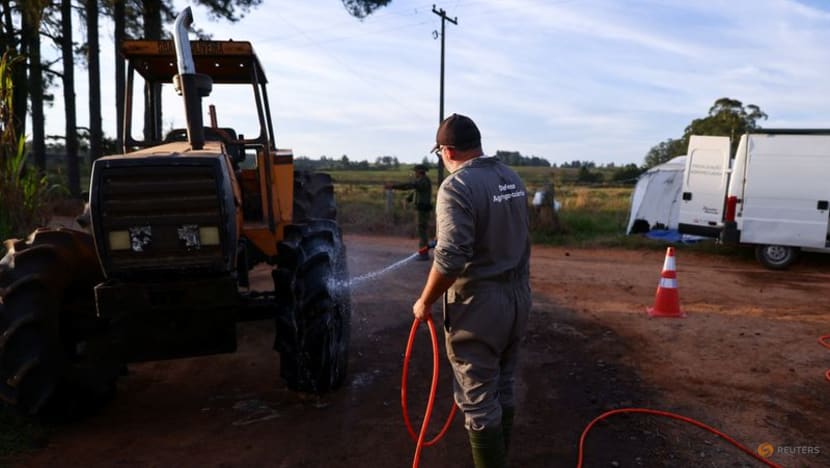Japan halts some poultry imports from Brazil after bird flu outbreak

A man cleans a tractor at a sanitary barrier, after Brazil confirmed its first outbreak of bird flu on Friday, triggering protocols for a country-wide trade ban from top buyer China and state-wide restrictions for other major consumers, in Montenegro, Brazil, May 17, 2025. (File photo: REUTERS/Diego Vara)
TOKYO: Japan has suspended imports of poultry meat from the southern Brazilian city of Montenegro and live poultry from the wider state of Rio Grande do Sul following a bird flu outbreak, an official at Japan's agriculture ministry said on Monday (May 19).
The ban took effect on Friday after Brazil, the world's largest chicken exporter, confirmed its first outbreak of bird flu on a poultry farm. The announcement triggered protocols for a countrywide trade ban from top buyer China and statewide restrictions for other major consumers.
Over half of China's chicken imports are from Brazil.
Japan also relies heavily on chicken imports from Brazil, and the spread of bird flu in Brazil could affect the meat market in Japan, where food prices are already on the rise.
According to the Ministry of Agriculture, Forestry and Fisheries, Japan's self-sufficiency rate for poultry meat, including processed products, is around 65 per cent.
In the 2024 fiscal year, which ended on Mar 31, Japan imported about 429,000 metric tons of chicken meat from Brazil, accounting for nearly 70 per cent of poultry meat imports, excluding processed items.
"We will closely monitor the impact on domestic distribution and market conditions," a ministry official said.
The European Union and South Korea are among other major importers who have banned Brazilian chicken.
Singapore imports 48 per cent of poultry from Brazil, according to figures from 2021. CNA has contacted the Singapore Food Agency for information on potential measures in response to the bird flu outbreak in the Brazilian city.
BRAZIL STEPS UP CONTROLS
The first case of bird flu was reported on a commercial farm in Montenegro, in Rio Grande do Sul state.
On Saturday, teams from Vibra Foods, a Brazilian operation backed by Tyson Foods TSN.N, which runs the farm, buried waste that had first been incinerated to prevent the spread of the virus.
The virus killed around 15,000 birds and the farm culled an additional 2,000. Vibra Foods did not respond to requests for comment.
Brazilian authorities at the state and federal levels have scrambled to prevent the disease from spreading.
On Saturday, the government of Minas Gerais state said it destroyed 450 metric tons of eggs from Rio Grande do Sul.
Eggs from the affected farm were traced to locations in Minas Gerais, Parana and Rio Grande do Sul, Brazil's agriculture ministry said, adding they would be destroyed.
Brazil's agriculture ministry and Rio Grande do Sul's department of agriculture have created a task force in Montenegro to prevent the virus from spreading, with officials visiting 524 properties within a 10km radius of the farm where the first case was found.















